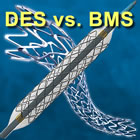|
The ZEUS (Zotarolimus-eluting Endeavor Sprint stent in Uncertain DES Candidates Study) trial was a multinational, single-blinded trial involving 1,606 patients, randomly assigned to receive either the Endeavor zotarolimus-eluting stent or a bare metal stent. Although guidelines recommend 6-12 months of dual antiplatelet therapy (DAPT) after drug-eluting stent implantation, as compared to only 1-3 months for bare metal stents, the duration of dual antiplatelet therapy in ZEUS was determined by the patient's clinical characteristics and risk factors, and not by the type of stent. The purpose of the study was to remove the consideration of DAPT duration from the decision of which type of stent to use, to see whether implantation of the drug-eluting stent would decrease the incidence of major adverse cardiovascular events at one year, compared to implantation with a bare metal stent, specifically among the type of patients who would normally be recommended to have a bare metal stent. Patients were enrolled at 20 sites in Italy, Switzerland, Portugal and Hungary. All underwent percutaneous coronary intervention with stent implantation. Adult patients who met any one of the three criteria (high risk for bleeding, high risk for stent thrombosis, low risk for in-stent restenosis) and who would therefore normally be recommended to have bare metal stents, were randomly assigned to receive bare metal or drug-eluting stents. Of note is the fact that patients who were unstable, suffering from acute coronary syndrome or experiencing a heart attack, either NSTEMI or STEMI, comprised 64% of the patient cohort. STEMI patients are almost always treated with bare metal stents because of concerns over increased risk of blood clotting. The results of the ZEUS trial: a significantly higher number of patients in the bare metal stent group had major adverse cardiovascular events at one year, including all-cause death, non-fatal heart attacks or any procedures to re-open the artery. A total of 140 or 17.5% of patients with the drug-eluting stent had a major cardiovascular event in the first year compared with 178 or 22.1% of patients implanted with the bare metal stent. Patients with the drug-eluting stent also had lower rates of heart attack (2.9% vs. 8.1%) and repeat procedures to re-open the artery (5.9% vs. 10.7%). This DES group also had half the rate of stent thrombosis (2.0% vs. 4.1%). The rate of bleeding did not differ between groups.
"Given the assumed risks, we were surprised by the lower rate of heart attack and blood clots among our drug-eluting stent patients," said lead investigator Marco Valgimigli, M.D., Ph.D., cardiologist and associate professor, Erasmus University Medical Center in the Netherlands. "For the first time, we have handled a drug-eluting stent as we would a bare metal stent in terms of the duration and intensity of antiplatelet therapy and have still shown the superior safety and efficacy of the drug-eluting stent." 95.4% of patients took some course of dual antiplatelet therapy after stent placement, mostly consisting of aspirin and clopidogrel. Duration of the therapy ranged from no treatment to one year, with a median of only 32 days. Patients who were not eligible for dual antiplatelet therapy were treated with either aspirin or an antiplatelet alone. Again, this protocol represents a departure from current guidelines that recommend the use of dual antiplatelet therapy for six to 12 months after the placement of a drug-eluting stent. In a press release, the American College of Cardiology stated, "The positive finding in ZEUS for patients receiving a shorter than currently recommended course of blood thinners may call into question existing guidelines for a more prolonged antiplatelet therapy following placement of drug-eluting stents, which points to the need for a more personalized approach, according to authors." Indeed, in an interview with Angioplasty.Org, Dr. Valgimigli called the entire use of bare metal stents into question. He stated:
As for cost-effectiveness, Dr. Valgimigli added that, if the use of a DES can significantly reduce the rate of repeat procedures, the higher price of the drug-eluting stent may become inconsequential. An important point is that the authors cautioned that this study pertains to the Endeavor zotarolimus-eluting stent (ZES) only and may not apply to other types of drug-eluting stents. The Endeavor has unique rapid elution kinetics of 14-28 days, whereas most other DES are 3-6 months. According to Valgimigli, additional research is needed to determine whether the personalized dual antiplatelet therapy tested in this study can be safely implemented in patients using other types of drug-eluting stents. He also suggests that a longer follow-up study be conducted to confirm results of this study over time. Support for the study was provided by Medtronic. Reported by Burt Cohen, March 31, 2014 |


